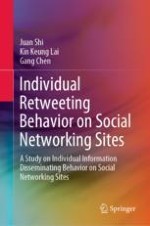2020 | OriginalPaper | Buchkapitel
4. Dominating Factors Affecting Individual Retweeting Behavior
verfasst von : Juan Shi, Kin Keung Lai, Gang Chen
Erschienen in: Individual Retweeting Behavior on Social Networking Sites
Verlag: Springer Singapore
Aktivieren Sie unsere intelligente Suche, um passende Fachinhalte oder Patente zu finden.
Wählen Sie Textabschnitte aus um mit Künstlicher Intelligenz passenden Patente zu finden. powered by
Markieren Sie Textabschnitte, um KI-gestützt weitere passende Inhalte zu finden. powered by
